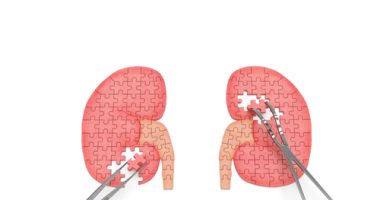Symptoms of Alport Syndrome
Kidney Disease
As the filtering units of the kidneys are made up of type IV collagen, the functionality of the kidneys is reduced in Alport syndrome patients. Thus, the primary symptom that Alport syndrome patients experience is the presence of blood in the urine, known as hematuria.
Typically, kidney transplant and dialysis are considered in more severe cases, and symptoms associated with renal function tend to improve after a kidney transplant.
Hearing Loss
Alport syndrome-associated hearing loss is typically identified prior to the onset of kidney failure, though this symptom does not affect all Alport syndrome patients. The inner ear structure, made up of type IV collagen, can worsen in its ability to transmit sound. When hearing loss does occur, it typically presents itself by late childhood and may results in deafness by age 40. Hearing aids can be used to help patients with progressive hearing loss.
Eye Abnormalities
The lens, retina, and cornea are all reliant on the effective production of type IV collagen. Abnormally-shaped eye lenses, referred to as anterior lenticonus, affects approximately 15 percent of Alport syndrome patients. This condition can lead to early-onset cataracts.
For most Alport syndrome patients, eye abnormalities are diagnosed in middle age or later, long after kidney problems have already developed.






